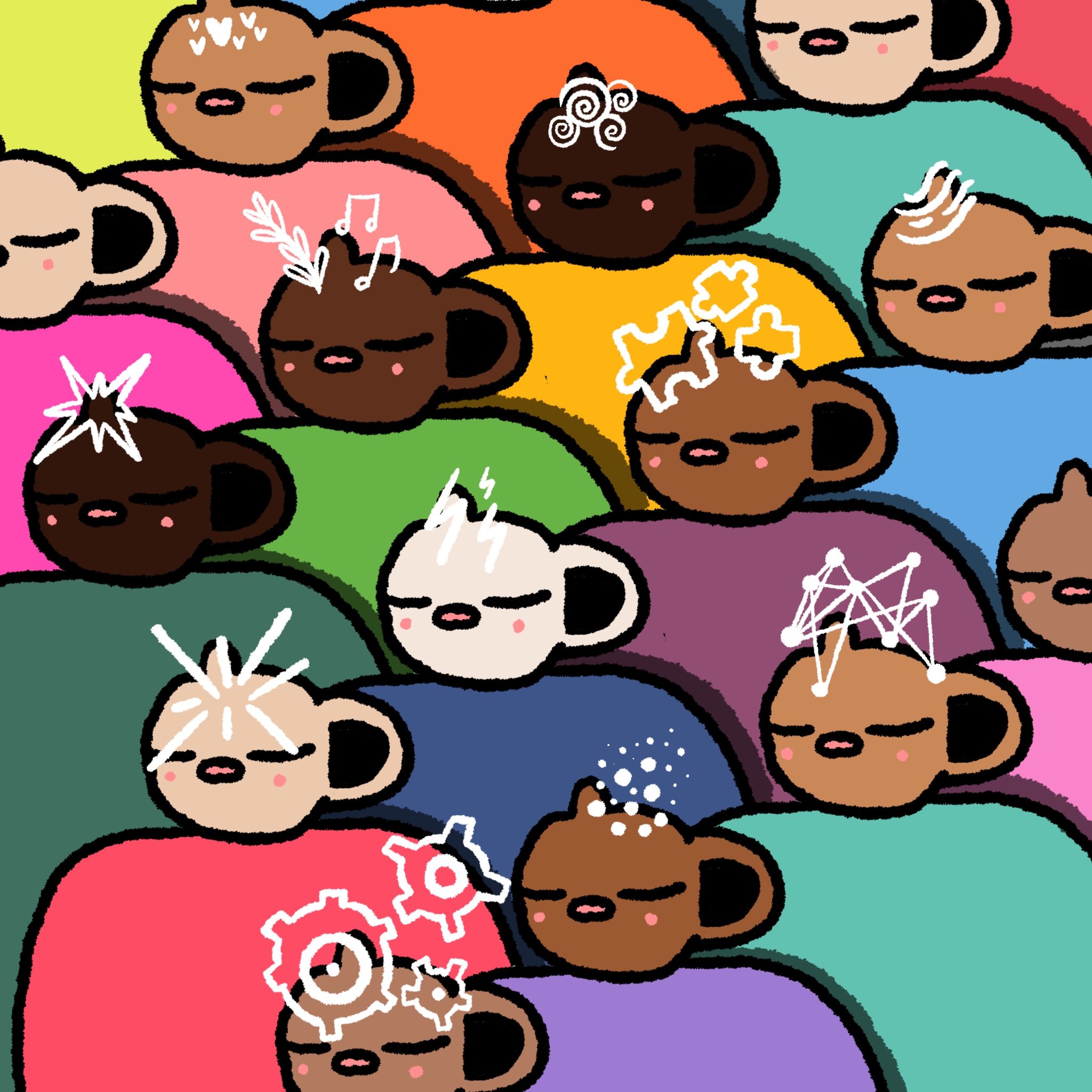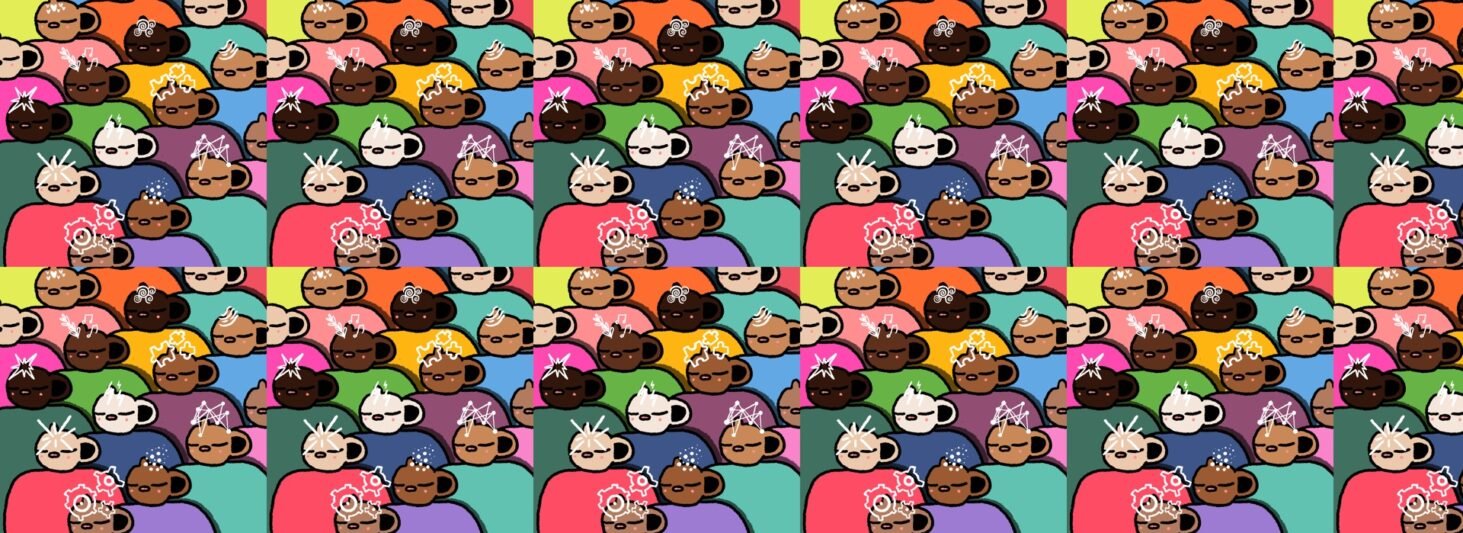The past few months, following the launch of my book, have taken me across the UK to meet people wanting to discuss neurodiversity. In bookshops and halls, people have come with stories of their own struggles and triumphs, excited to talk about a subject they’ve discovered a new language for. After all of these events, I have been left struck by one conclusion: people are desperate to know how we can use the concept of neurodiversity to improve the world around us.
Neurodiversity is a word often attributed to the work of the Australian sociologist Judy Singer. However, it was actually coined in online autistic-run spaces such as Martijn Dekker’s ‘InLv’ in the late 90s. Consisting of mailing lists and conferences like Autreat, these were (often online) support groups created by and for autistic people, where members could discuss their experiences, build friendships, and offer support and tips for common struggles. In a world that is actively hostile to neurodivergent people, these spaces became a lifeline.
In recent years, the word ‘neurodiversity’ has undergone a sudden influx in popularity.
A paradigm shift
Created to recognise the natural neurological diversity that exists amongst human beings – that is, that people’s brains work in different ways – the term’s political origins and uses are often overlooked. The neurodiversity movement itself began as a way to combat the widespread idea that the way autistic people live and communicate is somehow deficient. Helping to interrogate the idea of ‘normality’ and dispel the idea that there is only one ‘correct’ form of neurocognitive functioning, Dr. Nick Walker explained that neurodiversity was in direct opposition to what she termed ‘the pathology paradigm.’
This paradigm assumes that:
- There is one ‘right,’ ‘normal,’ or ‘healthy’ way for human brains and human minds to be configured and to function (or one relatively narrow ‘normal’ range into which the configuration and functioning of human brains and minds ought to fall).
- If your neurological configuration and functioning and, as a result, your ways of thinking and behaving, diverge substantially from the dominant standard of ‘normal,’ then there is ‘Something Wrong With You.’
The opposite of this, ‘the neurodiversity paradigm,’ is therefore inherently political. Understanding neurodivergence as a form of human diversity means it is open to the same dynamics of oppression and power as other groups — particularly those marginalised due to race, gender, or sexuality.
Unpacking ableism
Much of what sits behind the deficit-based model of neurodivergence is ableism, what Stacy Milbern described as ‘a system of oppression that favours able-bodiedness at any cost, frequently at the expense of people with disabilities.’ In the context of neurodiversity, this ableism has led to the creation of barriers that prevent neurodivergent people from equitable participation. These barriers result in social exclusion and limited access to opportunities in areas like education, employment, healthcare, and public spaces.
The neurodiversity movement seeks to dismantle these barriers and the systems that uphold them, by depathologising conditions that have traditionally been weaponised to justify abuse, criminalisation, and other types of harm.
Since my own autism diagnosis in 2020, I have spent the last few years unpicking the history of this movement. Talking to neurodivergent friends and academics, reading about the lives of neurodivergent people and the political forces that shape them, spending time with other autistic people – many of whom seek a world where they feel like they belong.
Many of the people I’ve spoken to have been surprised by the political origins of neurodiversity, unaware of campaigns like Spectrum 10K where organisers have used neurodiversity as a political framework to form boycotts, hold protests, and fight for change.
For me, this means we need to do a better job of positioning neurodiversity as a social justice campaign, rather than a helpful buzzword.
At a crossroads
Currently, the neurodiversity movement is at a key turning point. Having gained mainstream recognition, there is now an opportunity to harness the work that’s been done and push for radical, positive change. Change that leads to, for example, an end to the long-term incarceration of autistic people because of underfunding community support, an end to the lethal consequences of a benefits system that fails to protect disabled people, or achieves improved provisions in schools to help fix a ‘broken’ SEND system.
However, despite these opportunities for progress, there are still critical issues at play.
In the UK, the continued lack of understanding around autism and other types of neurodivergence was highlighted by Kemi Badenoch’s recent pamphlet debacle. The Tory leader was rightly called out for distributing a ‘Conservatism in Crisis’ campaign essay that not only incorrectly labelled autism as a mental health condition and anxiety as a type of neurodivergence, but claimed that autistic people received ‘better treatment’ and ‘economic privileges and protections.’
The National Autistic Society responded by highlighting the continued struggles of autistic people and their families, explaining that:
“Being autistic doesn’t offer economic advantages and protections, only three in 10 autistic people are in any form of employment, the lowest of any disability. Reasonable adjustments are in no way an immediate pathway into economic privilege, but a legal right to make sure autistic people can participate in work, education and live a dignified life.”
So, despite an increase in discussions around neurodiversity, a lack of understanding prevails.

Selling out
Beyond this, one of the major threats the movement faces is the risk of commodification and neoliberal co-opting of what is at its heart, a radical social justice campaign.
In recent months, this threat took centre stage after the unveiling of NeuroAffirm, self-promoted as the “world’s first searchable directory of vetted neurodiversity affirming providers.” The website displays no shared criteria for the vetting in question, which is supposedly provided through paid membership, nor does it provide any information on what the creators constitute as ‘neurodiversity affirming,’ nor indeed demonstrates any interaction with the research being done on the subject. Unfortunately, this suggests that whilst the project uses the language of the neurodiversity movement, its only real purpose is profit.
Whilst generally there is evidence that parts of society are beginning to embrace the concept of neurodiversity, we are at risk of only pursuing what neurodivergent academic Dr. Chapman terms ‘Neoliberal Neurodiversity,’ where we use the language of neurodiversity to make progress which impacts the lives of certain individuals but makes no concrete changes to the systems we all live under.

Join our mailing list
Sign up for shado's picks of the week! Dropping in your inbox every Friday, we share news from inside shado + out, plus job listings, event recommendations and actions ✊
Sign up for shado's picks of the week! Dropping in your inbox every Friday, we share news from inside shado + out, plus job listings, event recommendations and actions ✊
Often focusing on the perceived strengths of a neurodivergent person, they posit that Neoliberal Neurodiversity is an approach usually harnessed for profit. An example of this might be in the workplace, where a company sends out an email to celebrate Neurodiversity Awareness Month and neurodivergent people’s positive contribution to profit margins, but has a hiring process or working conditions that are actively hostile to neurodivergent workers, or who refuses to incorporate reasonable adjustments asked for by current disabled employees.
I believe that navigating the real priorities of projects that use language from the neurodiversity movement can often be aided by asking the question, ‘Is this liberating neurodivergent people or is it just making someone money?’ It’s no secret that capitalism allows us to commodify anything and everything, but I believe the work that truly benefits neurodivergent people will put people above profits — it will be work that pushes us to dismantle any system that fosters discrimination or marginalisation.
What next?
It is in our best interest to reject a co-opting of the neurodiversity movement and ensure that the work done in its name does not become divorced from its political aims.
This can be done by focusing on the work and practices that emerge from grassroots neurodiversity advocacy, or those topics being pushed for by the community itself.
One example of this work is the connection between the neurodiversity movement and the fight for abolition. Research in recent years has shown that neurodivergent people are incarcerated at staggering rates and over-represented in the prison system. Since there is no evidence to suggest that neurodivergent people are inherently more likely to engage in crime, we can only assume that living in an ableist society leaves us open to systemic injustice. A matter that is cruelly demonstrated by the loss of another autistic life at the hands of police this year.
Putting an end to this trend may require reallocating funds currently dedicated to policing toward services that are both preventive and supportive. This might include investments in housing, mental health care, community-based crisis intervention teams, and peer-led support networks like Project LETS – a grassroots organisation led by and for Disabled and neurodivergent people and psychiatric survivors, dedicated to political education and advocacy work. It will require improved access to non-criminalised work, the creation of structural policies that prioritise care over punishment, and systems that no longer criminalise neurological difference.
This is just one example of the type of work that can be done using the political framework that the neurodiversity movement continues to build upon. By using the discussions around disability and ‘normality’ that have been sparked by the neurodiversity movement, we can make a call for greater political urgency and ask that we rethink the ways we organise our societies. We can use neurodiversity advocacy to demand improvements to social welfare, reject medical privatisation, end the social exclusion and abuse of disabled people, and much more.
Fighting for collective liberation in this way not only strengthens the work of neurodiversity advocates, but ensures the work done is intersectional and cognisant of the multiple systems of oppression that might impact us all at any one time.
Neurodiversity is more than a buzzword, it demands cross-movement solidarity, the extension of radical compassion, and a rejection of pathologisation. It is capable of holding a spot amongst wider liberation movements, if we push beyond simple assimilation.
What can you do?
Read:
- Empire of Normality: Neurodiversity and Capitalism, Robert Chapman
- Neuroqueer Heresies, Nick Walker
- Unmasking Autism: The Power of Embracing Our Hidden Neurodiversity, Dr Devon Price
- Health Communism: A Surplus Manifesto, Artie Vierkant and Beatrice Adler-Bolton
- 10 Principles of Disability Justice, Sins Invalid
- What is Health Justice?
Listen:
Watch:
Follow:
- @projectslets
- @neuroabolition
- @sinsinvalid
- @fidgets.and.fries
- @drdevonprice
- @nonspeakers.r.us
- @open_future_learning

